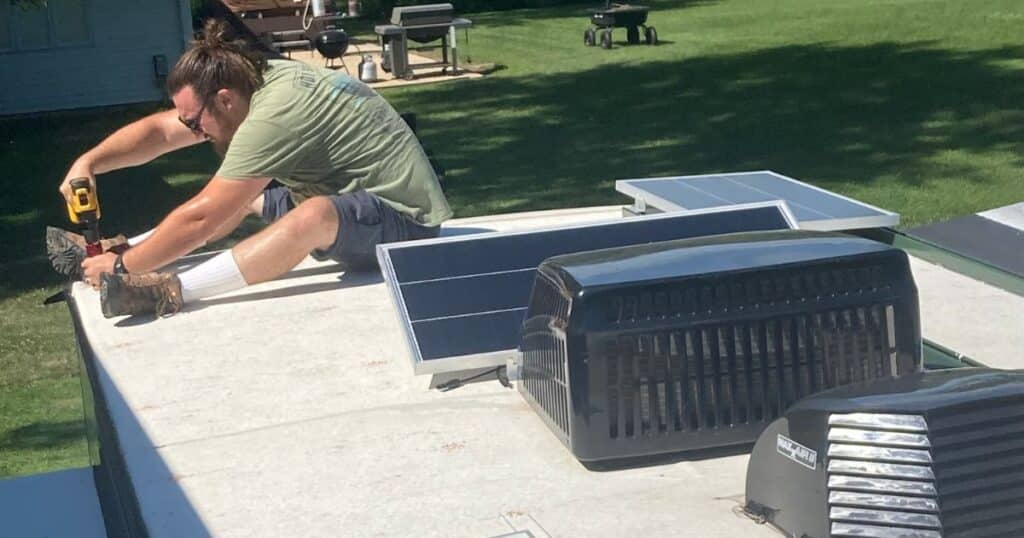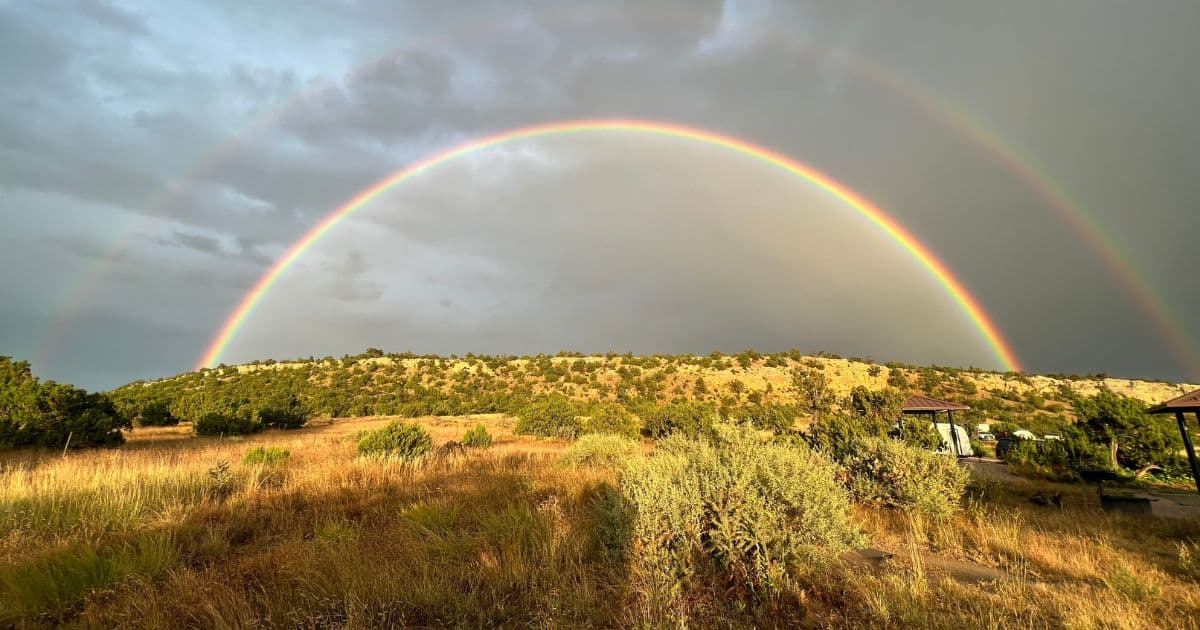When we made the decision to spend more time camping off the grid in our travel trailer, figuring out how we were going to generate enough energy to power our lifestyle was priority number 1. As we were doing our research, we quickly found ourselves debating between the 2 most common energy options for RV boondocking: solar power vs generator.
Spoiler alert: it’s possible that the combination of both a solar power system and a generator might make the most sense for your situation, especially if you live and travel full time in your RV like we do. So don’t feel like you have to be loyal to one solution or the other.
But given the expenses involved with both solutions, you may be wondering which option is the best place to start. So let’s take a look at the pros and cons of each type of energy solution, as well as advice from people who are currently living and traveling off the grid.
Pros and Cons of Solar for Boondocking
Solar power for RV boondocking tends to be more expensive than getting started with a generator. That’s because there’s more upfront equipment and labor required for an RV boondocking solar system. And while it’s possible to DIY solar power, it can be a complicated project and if you’re not confident in your ability to work safely with electrical systems, it’s best to hire a professional.
But having a solar system onboard your rig is great because it’s a clean, quiet, and smaller-footprint power source. And once it’s installed, you’ll have access to a renewable energy source at your fingertips without the ongoing maintenance and fuel costs associated with RV generators.
Here are some of the biggest benefits of powering your RV with solar power:
- It’s a clean, renewable energy resource
- It’s self-sufficient; there’s no need to purchase additional fuel
- It’s quiet, allowing you (and your neighbors) to better enjoy the sounds of nature
- It has a smaller footprint: it weighs less and takes up less space in the camper
- It requires less ongoing maintenance once its setup
- It tends to have higher upfront costs than a generator
- It’s more complicated to setup (and may require a professional install)
- It can’t generate power without access to sunlight (i.e. during the night, under heavy cloud cover, in dense forests)
- It takes longer to get a return on your investment, especially if you’re only camping occasionally

Full disclosure: we chose solar to power of our full time RV boondocking lifestyle. Since we were planning to spend a year exploring the southwestern United States where there’s plenty of sunshine and not a ton of dense forest, it was the logical place for us to start.
Get the monthly newsletter.
Spam sucks. So don’t expect any from us! Once a month, we’ll send you personal stories and photos from our travels to inspire you to get wild.
Pros and Cons of a Generator for Boondocking
Using a generator while camping off the grid is very similar to the experience of plugging in to a developed campground’s electrical utilities. Except, instead of connecting to the power grid, you’re connecting to a machine that generates power for itself.
There are many different types and sizes of generators out there, but they all basically work the same way. Using fuel (such as liquid propane, gasoline, or diesel), they generate the energy that you need to power your appliances while camping off the grid.
Here are some of the biggest benefits of powering your RV with a generator:
- The upfront costs of a generator are usually significantly less than a solar system
- It works in more locations and during all times of the day since it doesn’t rely on the sun
- It generates more energy more quickly than solar panels
- The ongoing maintenance and fuel costs add up over time, increasing your energy costs
- Generators are noisy and many places require generators to be turned off during quiet hours
- Generators have a larger footprint than solar power and may add a lot of weight to your RV
- It can be difficult to find the fuel to run your generator in remote locations

Generators are a great option if you’re looking to get started with RV boondocking quickly and don’t want to invest a bunch of money upfront for a solar system. But, they will require ongoing fuel and maintenance costs that add up, and in many cases you’ll end up paying the same amount (or more) as you would have for solar power in the long-run.
Still, the added flexibility to camp in places with denser forests or other factors that limit your access to the sun make generators an attractive option. We plan to get a small generator for backup once we leave the American southwest.
Energy Advice from Experienced Off Grid Campers
Rachel and Cole, Traveling Full Time in a 18ft RV
Rachel and Cole are full time RVers, traveling in an 18-foot travel trailer. Check out their YouTube channel, Workin’ for the Wild, and follow along with their adventures on Instagram. Here’s their advice for travelers who are considering solar power and/or a generator for RV boondocking:
Consider the size of your rig, the area you plan on camping, and how long you want to be off grid for. If you’re worried about space and weight, a generator might not be the best idea. Depending on the type, they can add hundreds of pounds and will need to be stored somewhere in your rig. You will also need to have gas or diesel fuel on hand to run it. If you’re in a larger rig with plenty of space, this might not be a problem. We live full-time in a small (18ft) travel trailer and have no plans to add a generator.
If you’re planning to camp in areas with decent sun, solar is a game changer. It’s a bit of an investment upfront, but can allow you to stay off grid and run most appliances for days or even weeks! We love our solar setup and feel it is absolutely worth the investment. The only drawback we’ve experienced is we can’t run our AC off grid. Most battery banks are just not large enough to generate the power required for an AC unit. So if you’re camping off grid in extreme heat, a generator might be the best option.
Kristin, Traveling Full Time in a 32ft RV
Kristin is a full time nomad, writer and a passionate travel planner. Learn more about Kristin on her website, Kristin in Motion, and stay connected to her adventures on Instagram. Here’s her take on solar power and/or generators for off grid RV living:
My biggest piece of advice is to make sure that you have a generator backup even if you decide to invest in solar! Depending on where you are, you may go period of time without proper sunlight, so having that generator there to quickly charge the batteries back up is super important.
We also opted for an inverter that wasn’t strong enough to power certain things like the microwave or air conditioner, so we just pop on the generator real quick and get full use of our high-energy appliances!
Allison, Traveling Full Time in a Class C Motorhome
Allison has been living full time in her Class C motorhome since 2020. Learn more about Allison on her blog, Allie Rambles, and stay connected to her journey on Instagram. Here’s her advice for those considering solar power and/or a generator for full time off grid travel:
I mostly boondock on public lands. My Class C motorhome came with a generator, but I did add a portable solar panel to my arsenal of power options. I probably use solar panel 90% of the time to charge my house batters so I can use that to power the basics in my rig like the lights and the water pump, as well as my laptop and cell phone using a small inverter.
On cloudy days the generator really comes in handy since, well, solar is useless without the sun. Let me also preface this by saying that I can charge my house batteries by running my coach engine; I don’t always need to use the generator and solar. The only time I truly need the generator is for running the air conditioning, blow dryer or toaster. My rule for anything while living in my RV is to always have a secondary source for necessities. So I do have a minimum of 2 sources of energy production.
Lauren and Chris, Traveling with Kids by Sailboat
Lauren is a friend of mine from college and I’m incredibly inspired by her family. They travel off grid via sailboat with 2 kids, which is pretty much the ultimate in off grid living, if you ask us! Stay connected with their adventures on Instagram. Here’s their advice for those considering solar power vs. a generator for off grid living:
Living on a sailboat off grid has its own set of power challenges. Solar has helped us not burn our precious (and expensive!) diesel to run our generator. It means less maintenance on the generator, and just simple, clean, quiet power.
We are in the process of adding more solar to our system to hopefully be completely solar and wind-powered for our house system. The main advantage for us is that we can stay in far away anchorages for longer and not worry about our fuel consumption. Lots of places either don’t have diesel, or have very dirty diesel.
Our advice to someone considering going with a solar system is to do it! Do the math on your consumption and size the system accordingly. You usually won’t need a huge system, and it can be pretty affordable. We do have a generator built into the boat, and would recommend a small generator if you plan to be off grid for a long time, just in case.
As you think about your installation, keep your lifestyle in mind. Living aboard a boat, or boondocking in the desert? You’ll likely be able to rely on solar for more of your energy. Nestled beneath trees in cool, rainy climates? You’ll need to plan for an alternative to solar.
Finally, factor your need for stored energy into your personal equation. We need to be able to balance high energy consumption at times (eg: running a reverse osmosis system to purify water) with normally low consumption (only a couple of LED lights on) – our large battery bank lets us have plenty of power available for those surge times.
We hope you found this article helpful as you consider your energy options for RV boondocking and camping off the grid. Have additional questions you’d like us to cover? Want to weigh in with your own advice for the boondocking solar vs generator debate? Drop a note in the comments!


